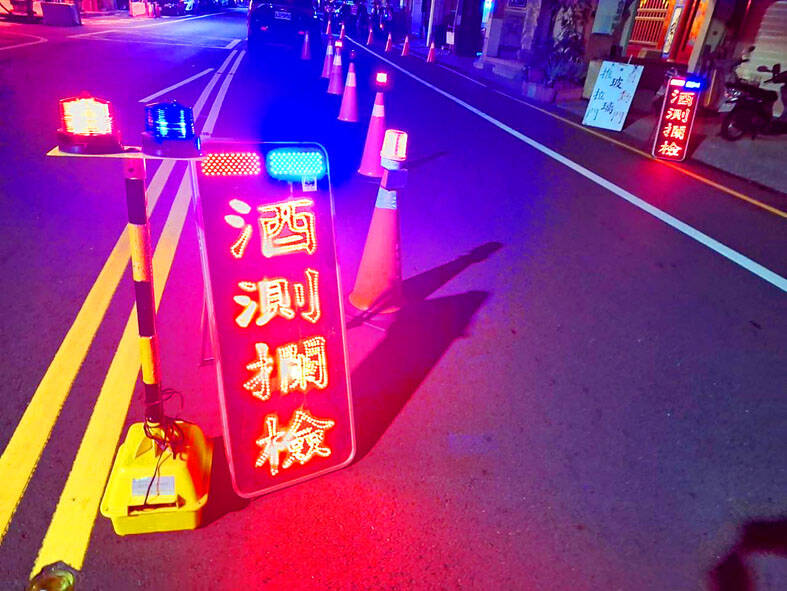The legislature’s Transportation Committee on Wednesday passed the first reading of amendments that would bar people convicted of drunk driving that resulted in death or serious injury from ever regaining their licenses, in the latest push to deal with the nation’s road safety woes.
The proposed changes to the Road Traffic Management and Penalty Act (道路交通管理處罰條例) also include provisions enhancing fines and penalties for driving without a license.
The current act stipulates that a drunk driver’s license cannot be permanently rescinded following the Council of Grand Justices’ Constitutional Interpretation No. 699 issued in 2011, the Ministry of Transportation and Communications has said.

Photo courtesy of the Tainan Police Department
Instead, people convicted of causing death by driving under the influence are eligible for a temporary driver’s license in six, eight, 10 or 12 years following the judgement, depending on the circumstances, the ministry said.
Such drivers may regain a permanent driver’s license if they incur no deductions to their driver’s license points, it added.
This part of the bill — which was sponsored by the Taiwan People’s Party — would permanently revoke the license of drunk or intoxicated drivers who caused death or serious injury with no possibility of regaining the privilege.
Those convicted or found responsible for other types of driving under the influence-related offenses would be able to regain their driver’s license under certain conditions, as before.
Legislators from across the political divide also agreed that the maximum fine for driving a motorbike or passenger vehicle without a license should be increased to NT$36,000 and NT$60,000 respectively.
The vehicle involved in unlicensed driving would be impounded immediately upon discovery, according to the amendments.
Lawmakers made the decision after Taipei Department of Public Transportation and Supervision Director-General Lin Fu-shan (林福山) told the committee that driving without a license on average causes 600 deaths and 60,000 injuries a year in Taiwan.
This figure is six times that of the number of deaths caused by drunk or intoxicated drivers, he added.
The bill would also raise the penalty for using non-original parts in vehicle exhaust pipes from NT$1,800 to NT$3,600, in a bid to prevent drivers from tuning bikes or vehicles to amplify engine noise.
Owners of vehicles found to have committed the offense would have 15 days to undo the modifications, which must be certified by an appropriate government office.
Pedestrians who do not yield to ambulances signaling an emergency with lights and sirens would face a NT$500 fine, while the penalty for those who intrude on railways and highways would be doubled to NT$4,800 from NT$2,400.
Additional reporting by CNA

Taiwanese were praised for their composure after a video filmed by Taiwanese tourists capturing the moment a magnitude 7.5 earthquake struck Japan’s Aomori Prefecture went viral on social media. The video shows a hotel room shaking violently amid Monday’s quake, with objects falling to the ground. Two Taiwanese began filming with their mobile phones, while two others held the sides of a TV to prevent it from falling. When the shaking stopped, the pair calmly took down the TV and laid it flat on a tatami mat, the video shows. The video also captured the group talking about the safety of their companions bathing

US climber Alex Honnold is to attempt to scale Taipei 101 without a rope and harness in a live Netflix special on Jan. 24, the streaming platform announced on Wednesday. Accounting for the time difference, the two-hour broadcast of Honnold’s climb, called Skyscraper Live, is to air on Jan. 23 in the US, Netflix said in a statement. Honnold, 40, was the first person ever to free solo climb the 900m El Capitan rock formation in Yosemite National Park — a feat that was recorded and later made into the 2018 documentary film Free Solo. Netflix previewed Skyscraper Live in October, after videos

Starting on Jan. 1, YouBike riders must have insurance to use the service, and a six-month trial of NT$5 coupons under certain conditions would be implemented to balance bike shortages, a joint statement from transportation departments across Taipei, New Taipei City and Taoyuan announced yesterday. The rental bike system operator said that coupons would be offered to riders to rent bikes from full stations, for riders who take out an electric-assisted bike from a full station, and for riders who return a bike to an empty station. All riders with YouBike accounts are automatically eligible for the program, and each membership account

A classified Pentagon-produced, multiyear assessment — the Overmatch brief — highlighted unreported Chinese capabilities to destroy US military assets and identified US supply chain choke points, painting a disturbing picture of waning US military might, a New York Times editorial published on Monday said. US Secretary of Defense Pete Hegseth’s comments in November last year that “we lose every time” in Pentagon-conducted war games pitting the US against China further highlighted the uncertainty about the US’ capability to intervene in the event of a Chinese invasion of Taiwan. “It shows the Pentagon’s overreliance on expensive, vulnerable weapons as adversaries field cheap, technologically